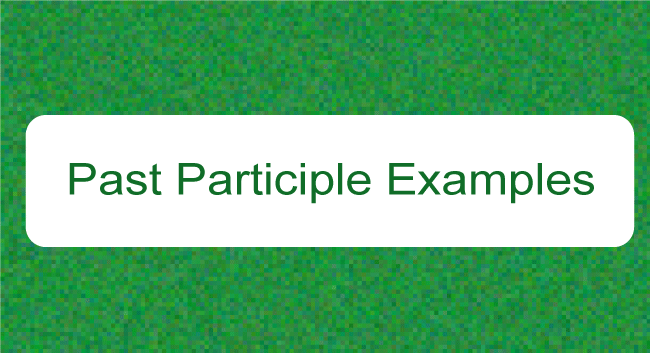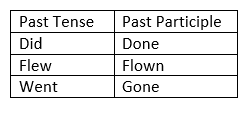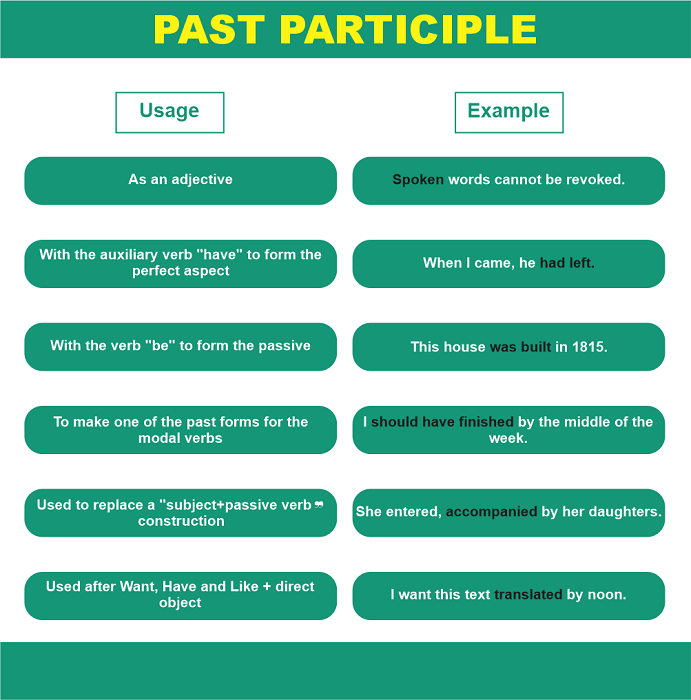Past Participle ExamplesParticiples, eh? The enchanted component of speech that appears to be a verb but frequently functions as an adjective. They can be flawless. They can be ongoing. So you have probably heard the term participle before, but you are not certain of its meaning. Or perhaps you understand what it means but aren't certain how to use those troublesome participles. After all, participles are a component of what makes those pesky irregular verbs so... pesky. Before we get too far ahead of ourselves, let us define a participle. 
What Exactly Is A Participle?A participle is a type of term that is taken from the verb and can be utilized as an adjective or to compose verb tenses. Participles are regarded as a distinct part of speech in comparison to the verbs, but they resemble the verbs from which they derive. The verb stroll, for instance, can be changed into the participles strolled and strolling. If you are a verb expert, you will realize that those two terms are the past and present tense forms of stroll. And you'd be correct! As we previously stated, participles frequently resemble verbs. However, participles can perform a variety of functions that verbs cannot and can help a verb in conveying certain complex actions. There are 2 kinds of Participles - Present Participle and Past Participle We'll look into past participle in this post; What is a Past ParticipleIn English Grammar, a past participle is a verb tense which usually finishes in -ed and usually has an assisting verb. However, these past participle instances will help you in learning to recognize them. Learning the English language begins with understanding the various word structures, including verb tenses. One such verb tense is the past participle. To construct the past participle, combine an auxiliary verb, such as "was," "were," "had," or "had," with the verb's past tense form. You need to study some instances of this verb form to learn how to identify past participles. You'll become adept at finding normal verbs and irregular verbs in past participle format by studying both. The third kind of English verb is the past participle. 
To differentiate it from the past tense, it commonly ends as the -en participle. It is due to the fact that numerous common English participles end in -en, such as write, wrote, and written. There are 2 types of past participles, these include; the regular and irregular. Regular past participles are generated in a similar manner as regular past participles by appending -ed to the root form or -d if the root form already finishes in -e: For instance
Irregular past participle variants, like irregular verb past forms, are highly unpredictable. Likewise, many irregular past participles finished in -en, an uniformity that seems to have originated in ancient periods of English. However, around one-third of irregular past participles still have the -en suffix. As a result, we know instinctively that an irregular verb form finishing in -en (or -n) is a past participle.
Note that the past form of a verb typically occurs by itself, whereas the past participle nearly always occurs after a version of be or had. Take note of the following: Some irregular verbs have similar past participle and present tense forms. Some examples of this include cut, hit, let split. In other examples the past participle differs entirely from the past tense: 
Also there are 2 varieties/ choices for both the past tense and the past participle: Burned - Burnt ; Dreamed- Dreamt ; Leaped- Leapt ; Showed - Shown ; Spilled - Split ; Spoiled- Spoilt ; There are several ways to employ the past participle. After the assisting verbs to be or to have, the past participle is used as the primary or the main verb:
In passive statements, past participles are frequently used after the assisting verb be:
Past participles are widely used as adjectives in addition to producing perfect tenses and passive forms of verbs.
Past Participle Instances- Utilized as AdjectivesPast particles can appear as adjectives in a statement. They alter a noun or pronoun by using the simple past tense (-ed) form of the verb. This usage is typically used as a predicate adjective, post a linking verb. Here are a couple such examples :

Examples of Past Participles - Used as Participle PhrasesIn English grammar, the past particle may also be used to start a participle phrase. These phrases serve as adjectives to characterize a noun or pronoun that appears later in the sentence. Here are a couple such examples:
Perfect Verb Tenses - Past Participle ExamplesThe present perfect tense employs the present-tense format of "have" to indicate previous action that is expected to continue at present as well as in the future. Likewise, the past participle can be found in three of the total six perfect verb tenses. These employ the aiding verb "have" as well as the past tense version of the verb. Perfect Present TenseThe first instance of this conjugation is the present perfect tense. This verb tense utilizes the present-tense form of "have" to indicate previous behavior that is expected to continue presently as well as in the future. Here are a few instances of the present perfect tense:
Perfect Past TenseThe past participle appears in the past perfect tense also. This verb tense employs the past-tense form of "had" to describe an activity that took place in the past before the next action took place. Here are a couple such examples:
Future Perfect TenseThe future perfect tense denotes an act that will be completed at a later date. It blends "have" in the future tense along with past participle. Here are some instances of past participles that can be utilized in the future perfect tense:
Irregular Verbs with Past ParticiplesThe basic form of the verb is accompanied by -ed in most past participles, like strolled or jumped. Unusual verbs, on the other hand, can terminate in a range of ways. Here are a couple such examples:
The Passive Voice with Past ParticiplesA passive statement is one where the subject is acted upon rather than the individual or thing performing the action. Passive sentences are often produced by conjugating the verb "be" with a past participle. Examples: Past participles and passive voice sentences
Concluding Lines On Past Participant ExamplesSo why must one be concerned about past participles? Understanding verb tenses and the various ways verbs can occur in sentences is critical when learning English. It educates you how to construct meaningful sentences. Past participles come effortlessly to native speakers. However, if you are learning English, it may take a bit more time to grasp on. In either case, studying examples will assist you in getting it properly.
Next TopicAntonyms
|
 For Videos Join Our Youtube Channel: Join Now
For Videos Join Our Youtube Channel: Join Now
Feedback
- Send your Feedback to [email protected]
Help Others, Please Share










